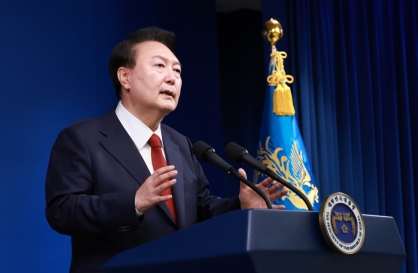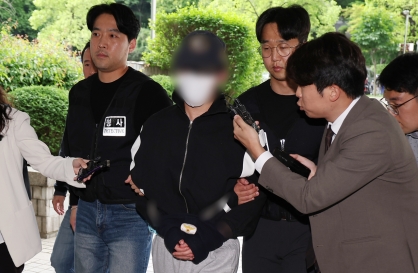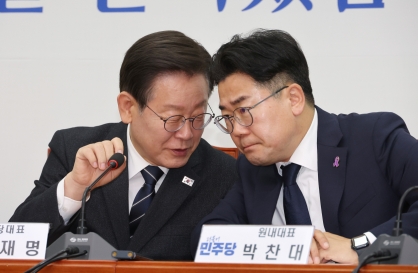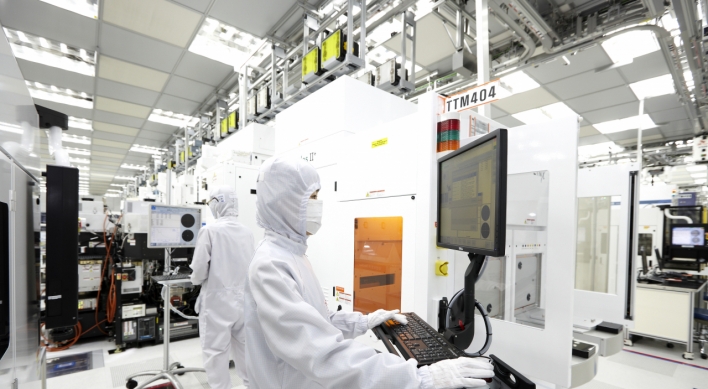Park launches advisory council, calls for growth potential revival
By Korea HeraldPublished : May 29, 2013 - 20:30
President Park Geun-hye on Wednesday launched a top economic advisory council of policymakers and economists, directing them to come up with ways to boost the economy amid waning growth potential.
The National Economic Advisory Council has been in operation as stipulated by the Constitution since 1999, but its role had remained meek. Park aims to use the council, which is the only economy-related advisory panel in this administration, as a brainstorming body with stronger say in economic policies, Cheong Wa Dae officials explained.
“The low growth trend is protracting while the growth potential is dropping rapidly,” Park said in an opening speech.
As the Korean economy faces the fastest aging society rate among OECD countries and the exceptional risk posed by North Korea, it is important to take preemptive measures, Park noted, underscoring a need for a fundamental paradigm change and to break away from the outdated growth model.
“(The council) must objectively diagnose our economic situation and identify and evaluate the most critical government policies and the mid and long-term direction of economic policies.”
The National Economic Advisory Council has been in operation as stipulated by the Constitution since 1999, but its role had remained meek. Park aims to use the council, which is the only economy-related advisory panel in this administration, as a brainstorming body with stronger say in economic policies, Cheong Wa Dae officials explained.
“The low growth trend is protracting while the growth potential is dropping rapidly,” Park said in an opening speech.
As the Korean economy faces the fastest aging society rate among OECD countries and the exceptional risk posed by North Korea, it is important to take preemptive measures, Park noted, underscoring a need for a fundamental paradigm change and to break away from the outdated growth model.
“(The council) must objectively diagnose our economic situation and identify and evaluate the most critical government policies and the mid and long-term direction of economic policies.”

Park listed countermeasures to global economic changes, creating an ecosystem for creative economy and realizing economic democratization as the major fields to tackle.
Park, who is the ex officio chairperson of the council, appointed 30 top economics scholars and experts as civilian members, including Inha University professor Hyun Jung-taik as deputy chief.
From the government, the deputy prime minister, minister for science, ICT and future planning, presidential chief of staff, senior presidential secretary for economic affairs and senior secretary for future strategy are also ex officio members.
About one-third of the civilian participants come from the Institute for the Nation’s Future, Park’s former think tank.
“The members range from veterans with vast experiences to young experts with international flair,” a Cheong Wa Dae official explained.
The council will operate in four subcommittees focusing on creative economy, public economy, fair economy and macro-finances.
The groups will gather each month and the council’s general meeting once every quarter of the year.
During the first meeting, the four major think tanks including Korea Development Institute, Samsung Economic Research Institute, Goldman Sachs and McKinsey made a report on Korean economy and future policy tasks.
The report said the economy shows a gradual weakening trend in terms of growth and distribution as growth centered on factor inputs, where earnings come from investment of labor and capital, reached its limit. A decline in the economically active population due to aging also contributes to the problem, the report said.
The report added that the economic growth rate that had reached an average of 8.6 percent in the 1980s, 6.4 percent in the 1990s and 4.5 percent in the 2000s has dropped to around 3 percent and below since 2010 and that this trend will persist.
They also pointed to large conglomerates hiring less and producing more overseas, low competitiveness of small and mid-sized companies, low-value added service industries and a rise in high-cost burden in household spending such as in child education as problem sources.
As countermeasures, the report suggested overcoming the structural weakness by stably operating macroeconomics but reforming the public sector, securing new growth engines and expanding investment in human welfare.
By Lee Joo-hee (jhl@heraldcorp.com)
-
Articles by Korea Herald









![[K-pop’s dilemma] Time, profit pressures work against originality](http://res.heraldm.com/phpwas/restmb_idxmake.php?idx=644&simg=/content/image/2024/05/08/20240508050705_0.jpg&u=20240508171126)









![[Today’s K-pop] Stray Kids to drop new album in July: report](http://res.heraldm.com/phpwas/restmb_idxmake.php?idx=642&simg=/content/image/2024/05/09/20240509050659_0.jpg&u=)